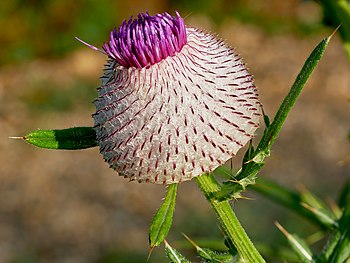Talk:Cirsium eriophorum
A fact from Cirsium eriophorum appeared on Wikipedia's Main Page in the Did you know column on 8 August 2020 (check views). The text of the entry was as follows:
|
| This article is rated Start-class on Wikipedia's content assessment scale. It is of interest to the following WikiProjects: | |||||||||||
| |||||||||||
| This article contains a translation of Wollkopf-Kratzdistel from de.wikipedia. |
Did you know nomination
[edit]- The following is an archived discussion of the DYK nomination of the article below. Please do not modify this page. Subsequent comments should be made on the appropriate discussion page (such as this nomination's talk page, the article's talk page or Wikipedia talk:Did you know), unless there is consensus to re-open the discussion at this page. No further edits should be made to this page.
The result was: promoted by 97198 (talk) 08:17, 2 August 2020 (UTC)
- ... that flower buds of the woolly thistle can be eaten in a similar way to artichokes? Source: "Flower buds - cooked. A globe artichoke substitute but much smaller and even more fiddly."
- Reviewed: Civil investigative demand
5x expanded by Cwmhiraeth (talk). Self-nominated at 18:23, 20 July 2020 (UTC).
- Reviewing. QPQ done, no copyvio issues, interesting hook. Will complete soon. Whispyhistory (talk) 14:32, 22 July 2020 (UTC)
 Greater than 5x expanded and long enough, enough references, hook in article and followed by a citation to a reference containing the hook fact. Verified in other sources I found too. Image quality and licence okay. Whispyhistory (talk) 14:42, 22 July 2020 (UTC)
Greater than 5x expanded and long enough, enough references, hook in article and followed by a citation to a reference containing the hook fact. Verified in other sources I found too. Image quality and licence okay. Whispyhistory (talk) 14:42, 22 July 2020 (UTC)
File:Cirsium eriophorum (Kozara National Park, Republika Srpska).jpg scheduled for POTD
[edit]Hello! This is to let editors know that the featured picture File:Cirsium eriophorum (Kozara National Park, Republika Srpska).jpg, which is used in this article, has been selected as the English Wikipedia's picture of the day (POTD) for April 21, 2021. A preview of the POTD is displayed below and can be edited at Template:POTD/2021-04-21. For the greater benefit of readers, any potential improvements or maintenance that could benefit the quality of this article should be done before its scheduled appearance on the Main Page. If you have any concerns, please place a message at Wikipedia talk:Picture of the day. Thank you! Cwmhiraeth (talk) 10:46, 2 April 2021 (UTC)

|
Cirsium eriophorum, the woolly thistle, is a tall biennial plant native to Central and Western Europe. The large, globose flowers can be up to 7 cm (2.8 in) in diameter. Each flower contains many tubular florets, with long purple tubes and purple stamens, each with a spiny bract covered with white woolly hairs through which a spine projects. This woolly thistle was photographed in Kozara National Park, Bosnia and Herzegovina. Photograph credit: Petar Milošević
Recently featured:
|



